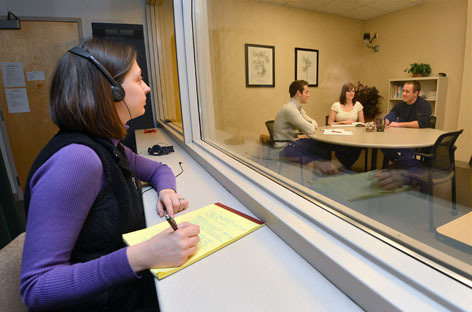
Jeanna Nation observes students conducting a "mock" counseling session at the Iowa State University Financial Counseling Clinic. Photo by Bob Elbert
AMES, Iowa – Demand for services at the Iowa State University Financial Counseling Clinic continues to grow, which is why the clinic is returning to its roots to better meet student needs. Financial counselors are helping students with everything from building a budget to managing their student loan debt and other college expenses.
“This is a one-stop shop for students who are stressed out about money. Our main goal is to relieve some of that stress. It’s not a place to come and consolidate your loans, but it is a place to come and ask about the impact of doing that and the impact of taking on another student loan,” said Jonathan Fox, director of the Financial Counseling Clinic and Ruth Whipp Sherwin professor in human development and family studies.
Counselors meet with hundreds of clients every year, but feel they could serve even more.
“We have about 600 appointments every year, which may seem like a lot, but there are more than 31,000 students on campus so that’s a very small drop in the bucket,” said Jeanna Nation, financial counselor and lecturer in the ISU Financial Counseling Clinic. “Really, to expand we have to have more support and the likely avenue for us is to utilize the students we train to go out and do this after they graduate.”
The idea to train students to work as peer counselors at the clinic is not new. Fox said the clinic was created with the intention to serve and train students. But over time that focus has shifted, and Fox wants to return to that original mission.
“We’ve been doing a lot more staff-based counseling, professional counseling,” Fox said. “Now we’re heading more toward making this a learning laboratory. That is what it was originally built as and originally conceived as – a place for students to learn.”
Dual role, dual benefits
Fox and Nation see it as a win-win for both students who rely on the clinic and students who want to earn a degree in financial counseling or planning. To make it work they will have to recruit new students to the family finance major. But giving students the opportunity to get real experience by working with clients is a strong selling point for the program.
“You’re going to get to come here and do this,” Fox said. “It’s really, really hard for students to get any sort of genuine experience where they would sit across the table and talk about finances with other people. With the clinic, we can very quickly get them in that setting.”
Students who seek services through the Financial Counseling Clinic have the option to meet with a peer counselor. Fox believes this can be less intimidating for students because they can better relate to another student. This is yet another reason why he wants more peer counselors working at the clinic. Staff counselors are still available to help students and will be available during all counseling sessions between peer counselors and students.
“We have an observation booth where we can watch the student counselors and make sure they’re doing OK. We’re there to step in so they’re not just thrown out there on their own,” Nation said.
This preparation will help students market their skills beyond Iowa State. Much like the demand at the clinic, there is a demand for personal financial advisors across the country. According to the Bureau of Labor Statistics, the field of personal finance is expected to grow 10 percent in the next 10 years. Fox said to a large degree, it’s a profession that is perfected with practice.
“Students can move quite quickly into gaining that experience that is necessary to get up to speed to be a very experienced counselor at the clinic. It’s one of those skills where you just have to do it,” Fox said.
In addition to expanding the clinic’s services, Fox said they are working on more research opportunities to study the benefits of counseling and best practices. The Financial Counseling Clinic is an on-campus, non-profit organization that provides financial education and counseling to students, faculty, staff and the Ames community.